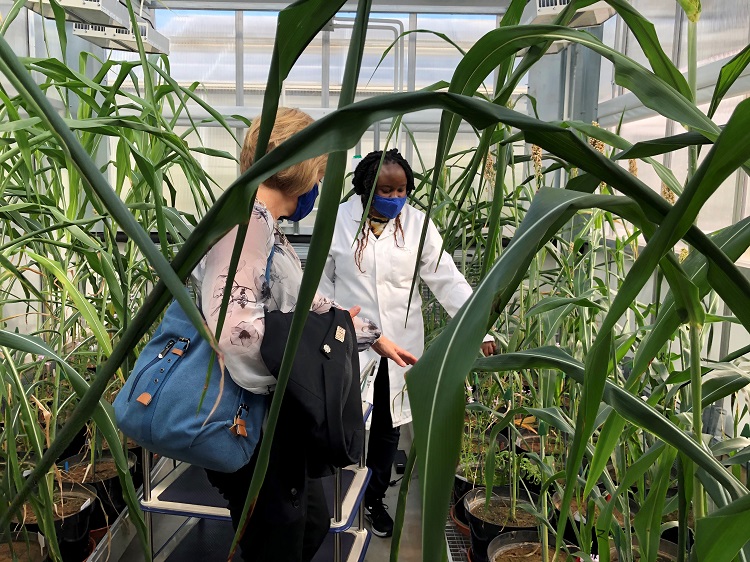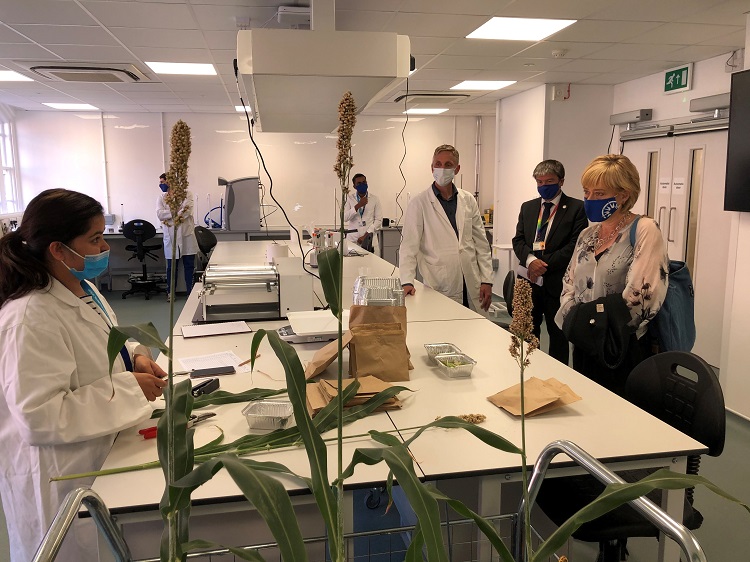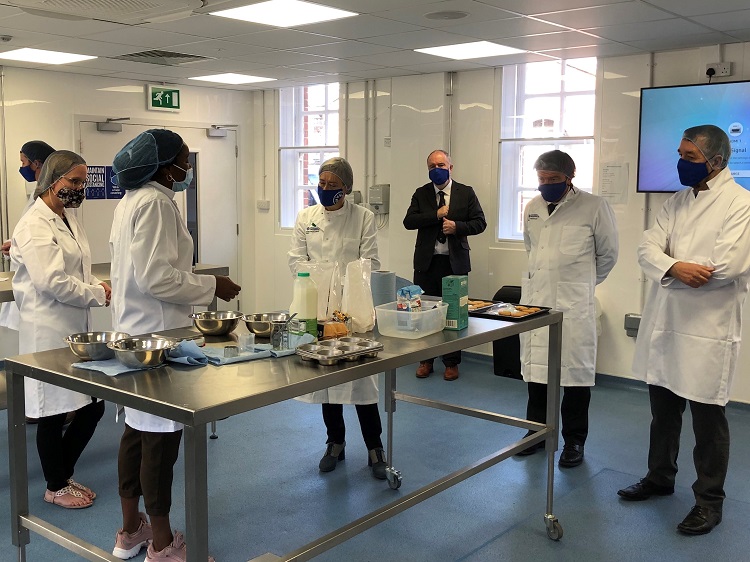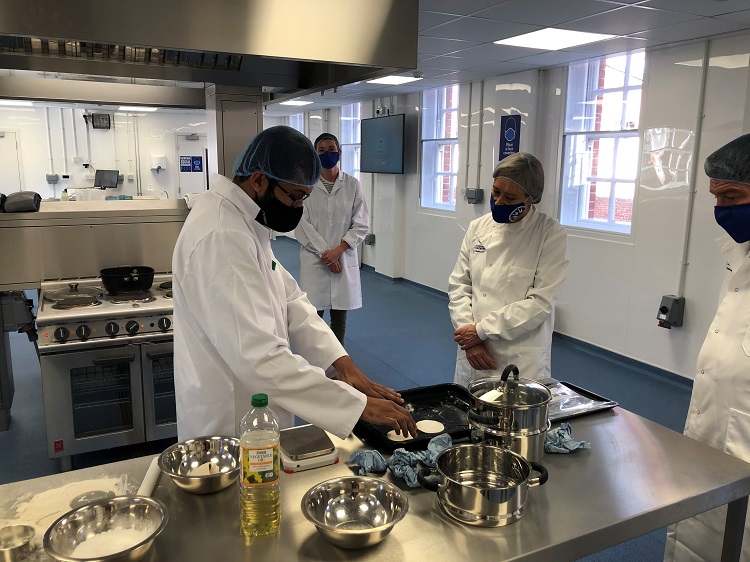On Wednesday 22 September, NRI officially opened three new buildings at its Medway campus, all dedicated to boosting agronomy and food product development at the University of Greenwich.
 Vice Chancellor of the University of Greenwich, Professor Jane Harrington, was there to tour each space and declare them officially open. She also spent time chatting with staff and students whose work the new facilities will benefit.
Vice Chancellor of the University of Greenwich, Professor Jane Harrington, was there to tour each space and declare them officially open. She also spent time chatting with staff and students whose work the new facilities will benefit.
The Agronomy Laboratory, a Food Product Development space and the Climate Change Greenhouse have all recently been completed in time for this year’s students and are already being used for the important food, crop and climate work conducted by scientists at NRI.
Construction work began in early 2020 just as the first lockdown kicked in, but as the campus was empty and the work was classified as ‘essential’, the workmen were able to continue with the groundwork whilst abiding by Covid safety restrictions.
‘essential’, the workmen were able to continue with the groundwork whilst abiding by Covid safety restrictions.
The Agronomy and Food Innovation labs are situated within the existing Royal Naval Dockyard’s historic buildings of Blake and Jellicoe, and the Climate Change greenhouse is brand new, purpose-built and sits perfectly between two of the original greenhouse structures.
These new facilities are mainly funded by UK Research and Innovation (UKRI) as part of their “Expanding Excellence in England (E3) programme. In addition to these facilities and with an E3 investment of £7.5 million, NRI has appointed more than 20 researchers and developed local and international collaborations under its Food and Nutrition Security Initiative. Amongst these new collaborations is the £18 million “Growing Kent and Medway” led by NIAB-EMR that supports local economic development through technology driven horticulture, fresh produce packaging, food and drink processing and its supply chains.
 NRI’s Simon Springate, Research Facilities Manager who oversaw the construction of the greenhouses says: “The new greenhouse will be crucial to our research on growing drought-tolerant plants, something that’s going to become more important as the planet heats up. We have five experimental compartments with temperature, humidity and lighting control. These can be used to simulate growing conditions from temperate to tropical conditions and will be used for FaNSI (Food and Nutrition Security Initiative) related work on crops and biotic and abiotic stresses.”
NRI’s Simon Springate, Research Facilities Manager who oversaw the construction of the greenhouses says: “The new greenhouse will be crucial to our research on growing drought-tolerant plants, something that’s going to become more important as the planet heats up. We have five experimental compartments with temperature, humidity and lighting control. These can be used to simulate growing conditions from temperate to tropical conditions and will be used for FaNSI (Food and Nutrition Security Initiative) related work on crops and biotic and abiotic stresses.”
NRI's Jonne Rodenburg, Associate Prof. of Agronomy who was leading the Agronomy laboratory development adds: "The Agronomy lab is closely linked to the new greenhouse. Here we can process and measure the plant materials and soils derived from it, as well as from farmers’ fields. The lab is equipped with the newest technologies for crop plants and soil processing and analyses, allowing us to conduct cutting-edge research on plant physiology and soil physics. For example, we can investigate how combinations of targeted plant nutrition, resistance and tolerance make sorghum plants more resilient against Striga, a parasitic weed that is causing great yield reductions in cereals on African smallholder farms. The new facilities and equipment greatly facilitate this kind of advanced scientific research focussed on tangible applications to solve some urgent agriculture problems."
closely linked to the new greenhouse. Here we can process and measure the plant materials and soils derived from it, as well as from farmers’ fields. The lab is equipped with the newest technologies for crop plants and soil processing and analyses, allowing us to conduct cutting-edge research on plant physiology and soil physics. For example, we can investigate how combinations of targeted plant nutrition, resistance and tolerance make sorghum plants more resilient against Striga, a parasitic weed that is causing great yield reductions in cereals on African smallholder farms. The new facilities and equipment greatly facilitate this kind of advanced scientific research focussed on tangible applications to solve some urgent agriculture problems."
 Dr Marcos Paradelo Perez, Fellow in Soils at NRI, has oversight of the installation of the new soil equipment: “The new state-of-the-art facilities will allow us to study soil hydraulic functions that control productivity, biological activity and climate change mitigation in soils. We are already investigating how tillage management in Kent’s vineyards affects soil structure and water storage and infiltration, which is paramount to grape quality.”
Dr Marcos Paradelo Perez, Fellow in Soils at NRI, has oversight of the installation of the new soil equipment: “The new state-of-the-art facilities will allow us to study soil hydraulic functions that control productivity, biological activity and climate change mitigation in soils. We are already investigating how tillage management in Kent’s vineyards affects soil structure and water storage and infiltration, which is paramount to grape quality.”
Dr Richard Fuchs and Julie Crenn explain the importance of having a dedicated area for Food Innovation: “The Food Product Development space provides us with a large area in which local businesses can work together with academics to create innovative products or improve their existing range. It will also serve as a teaching space, where students will be taught the process of developing new products as part of their degree programme. It’s an exciting addition to our infrastructure and will enable us to work even more closely with local food entrepreneurs”.
To find out more about:

